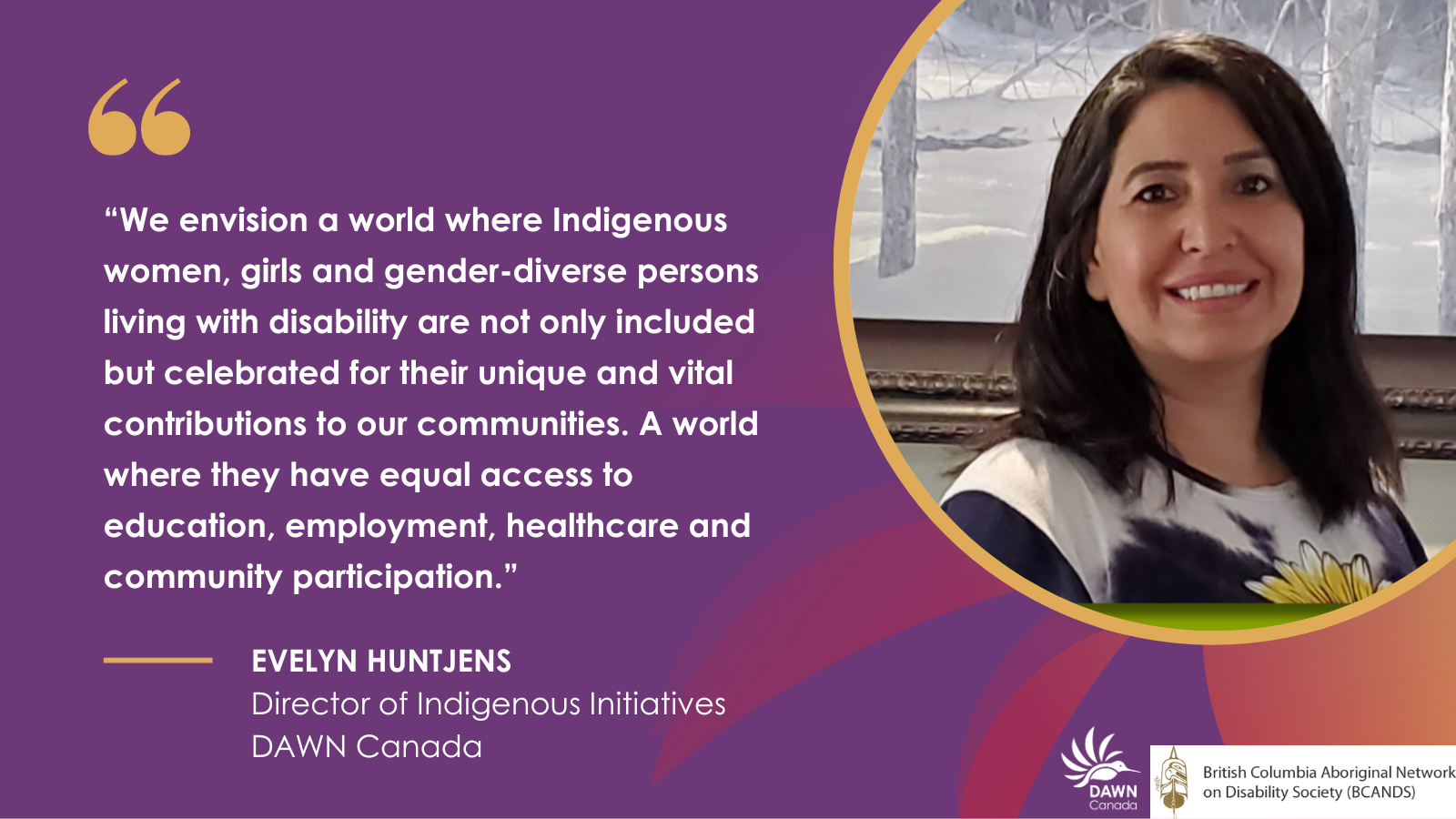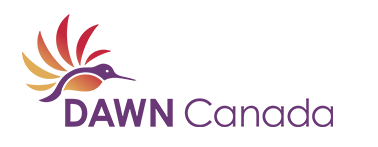International Women’s Day 2024: Evelyn Huntjens

My name is Evelyn Huntjens. I am a proud First Nations women and a member of the Xeni Gwet’in – Tsilhqot’in People of the Nemiah Nation located in the heart of B.C., with additional ancestry from the Montreal Lake Cree First Nation in Saskatchewan. I reside on Vancouver Island and live within the ancestral territory of the Quw’utsun First Nation. I am a mother, a daughter, a sister, a partner, a friend and an ally.
For the past year, I have worked in a cross-employment position with Indigenous Disability Canada, where I have worked since 2016, and the Disabled Women’s Network of Canada or DAWN. Through my position of Director of Indigenous Initiatives, I lead DAWN’s work in amplifying the voices of Indigenous women, girls and gender-diverse persons living with disability. I bring over seven years of leadership within the Indigenous disability and health sectors, with a focus on coordinating and developing navigation services for Indigenous persons living with disability that assist to ensure their economic, social and overall well being.
My dear sisters, allies, colleagues and champions of equality:
As we gather here today in recognition of International Women's Day, I stand before you as a woman, an Indigenous woman, and it is not lost on me that in the not so distance past, my voice and the voices of others like me, like you, were attempted to be silenced, ignored, disregarded and disrespected. But we are still here, and always will be, and I am proud and humbled to stand with you as leaders in the feminist human rights space, as advocates for the empowerment and inclusion of Indigenous women, girls, and gender-diverse persons living with disability. Our journey has been one of resilience, determination, and unwavering commitment to justice.
For too long, our voices have been silenced, our experiences marginalized, our rights disregarded with hollow promises of tomorrow being a better day. But tomorrow never comes, so today, as we stand together in solidarity, we declare that we will no longer accept the ways of the past and that together we will forge our own future. We demand recognition, respect, and equal opportunities for all Indigenous women, regardless of perceived ability, including within Indigenous and non-Indigenous communities, governments and their systems, organizations, everywhere, not just today but for all time.
For time immemorial we have been the guardians of ancient wisdom, the caretakers of our land, and the pillars of our communities. Yet, too often, Indigenous women, girls and gender-diverse persons face intersecting forms of discrimination and violence. We are disproportionately affected by gender-based violence, economic insecurity, and lack of access to essential services and resources.
But let me say this, as you all know, we are not defined by our challenges. We are defined by our resilience, our strength, and our unyielding spirit, we know what is right, and together, we have the power to create meaningful change, to dismantle oppressive systems, and to build a future where all Indigenous women, girls and gender-diverse persons can thrive.
Our work is not easy, but it is essential. We will continue to advocate tirelessly for supports, services and opportunities that improve the livelihoods and well-being of our sisters with disability. We will continue to challenge the stigma and discrimination that too often marginalize them. And we will ensure that their voices are heard and respected in every decision that affects their lives. We will hold them up so they take their role to lead this work unfettered. We will give back their power; that others have tried to deny them.
But our vision extends beyond mere survival, more than just adequate. We envision a world where Indigenous women, girls and gender-diverse persons living with disability are not only included but celebrated for their unique and vital contributions to our communities. A world where they have equal access to education, employment, healthcare, and community participation. A world where they are free to live authentically, without fear of violence, racism or discrimination. This shouldn’t be a dream; this should just be.
My sisters, let us be the change we wish to see in the world. Let us continue to speak truth to power, to uplift one another, and to build bridges of solidarity across our differences. Together, we can create a future where every Indigenous woman, girl, and gender-diverse person can live with dignity, equality, and respect, this is the right of us all.
To celebrate this International Women's Day, let us renew our commitment to justice, to solidarity, and to the relentless pursuit of a better world for all.
But the journey facing us will be long and arduous, as we know Indigenous women are disproportionately impacted by gender-based violence, poverty, discrimination, and racism.
In Canada:
- Over 60% of indigenous women and girls report being physically or sexually assaulted, with many never reporting these crimes.
- Over 50% of women and girls that are trafficked in Canada are Indigenous.
- Over 50% of women incarcerated in federal correctional institutions are Indigenous and these incarceration rates have increased over 70% over the last decade.
- First Nation women are five times more likely than non-Indigenous women to die by suicide.
- The mortality rate of on-reserve Status First Nation girls is 5 times the national average.
- Since 1980 over 4,000 Indigenous women, girls and gender-diverse person have been murdered.
- Over 50% of Indigenous women’s children live in poverty.
- Over 50% of children in care are Indigenous.
- Indigenous women are still being sterilized against their will or by coercion.
- Epidemic anti-Indigenous racism within Canada’s healthcare and other systems.
And this list goes on.
Indigenous women, girls and gender-diverse persons living with disability are on the top of the lists no one wants to be on, and on the bottom of the lists where everyone wants to be on the top.
These statistics paint a very bleak picture for the future of our young Indigenous women. These statistics speak to the gaps and barriers that all Indigenous women and girls face in pursuit of their livelihoods and we know these gaps and barriers increase with disability, remoteness and for Indigenous gender-diverse persons.
Understanding these realities, I often find myself asking:
How do we heal together?
How do we create the change we need?
How do we support Indigenous women, girls and gender-diverse persons living with disability to lead this change?
And finally…
How do we ensure what is built is never torn down?
DAWN Canada and Indigenous Disability Canada recognize the important role that peer support plays, enabling women, girls and gender-diverse persons to come together through shared lived experiences and to create safe and supportive spaces that allow for healing and personal growth.
Through the Rooting Resilience project, we have embarked to build a national coalition across Canada. We know that diverse girls, women and gender-diverse persons living with disability are experts on the barriers experienced to achieving their hopes, dreams and livelihoods, and how to dismantle these barriers. Our goal is to build the leadership and advocacy skills of these individuals to become agents of change for their rights in Canada. Our focus is to bring together Indigenous women, girls, and gender-diverse persons to join in this movement. Building Indigenous disability leadership is foundational to the work we want to achieve.
I want to take some time to speak to you about one of our most recent projects. I spent last weekend leading an Indigenous women’s retreat to validate the power of reciprocal relationships in Indigenous research while nurturing healing and advocacy. This project reflects the need to change the way we research Indigenous women, girls and gender-diverse persons.
This Indigenous women's retreat created a space where Indigenous women came together, shared their experiences, and contributed to meaningful policy discussions. This retreat was not just about addressing gender-based violence and disability; it was about nurturing healing and resilience within Indigenous communities.
Through traditional healing practices and cultural workshops participants found sanctuary to heal and reconnect with their Indigeneity. By facilitating open discussions on Indigenous spirituality and ancestral knowledge, we strengthened our connections to our ancestors and empowered these Indigenous women to reclaim/reconnect with their identities.
But perhaps most importantly, this retreat provided a platform for Indigenous women living with disability to shape policy discussions that directly affect their lives. Together we explored the intersectionality of Gender Based Violence and disability on their livelihoods, while working collaboratively to identify policy recommendations. These recommendations not only reflect the unique challenges faced by Indigenous women living with disability but also contribute to more inclusive and effective policies.
Furthermore, the retreat facilitated networking opportunities, connecting Indigenous women with disability organizations that are committed to advancing their rights and well-being. This networking has fostered a sense of community and peer support, strengthening the bonds between the Indigenous women participating and creating a network for ongoing collaboration.
This Indigenous women's retreat was more than just a weekend getaway; it was a transformative experience that honored Indigenous knowledge, fostered healing, and empowered Indigenous women living with disability to shape their futures. Through reciprocal relationships and shared experiences in our research, we can create a more equitable and inclusive society for all.
As I immerse myself in this new journey, I asked myself where should I be focused. My aim is to allocate resources to areas with the most pressing need for support and services, addressing significant gaps and barriers. It's evident that Indigenous women, girls, and gender-diverse individuals living with disability face profound marginalization, particularly in rural and remote settings. This marginalization is compounded by the heightened risk of experiencing gender-based violence, which unfortunately often leads to criminalization.
Presently, I am pursuing disability research within correctional institutions, particularly from the perspective of Indigenous women, girls, and gender-diverse individuals. Many invisible disabilities go unnoticed, alongside the trauma resulting from gender-based violence. Consequently, this oversight contributes to the disproportionate rates of incarceration among these marginalized persons.
Drawing from my experience in enhancing access to financial resources for Indigenous individuals living with disability, I understand the transformative power of financial security and stable housing. It's imperative that we extend these opportunities to our incarcerated sisters, lifting them from the cycle of criminalization perpetuated by colonization. We are aiming to align this work with the upcoming rollout of the Canada Disability Benefit which has the potential to improve the financial security of many Canadians.
I forge ahead with hope in my heart and fierceness in my pursuit for justice.
Together, we can unite. Together, our voices will resound. Together, we will reclaim our strength. We will seize control of our destinies and honor our traditional lifestyles. In solidarity, we will support one another. Hand in hand, we will forge the path of transformation. Side by side, we march, reclaiming our cultural heritage and rekindling our ancestral ties.
I want to conclude today with an appeal for the greater humanity of our world. We are in a precarious period of time where hate and intolerance grow alongside devastating conflicts around the world. I ask all of us to speak up and protect all of our women, girls, gender-diverse persons, children and those living with disability because we know they are disproportionality impacted by conflict and they deserve their voices to be heard. Please advocate for peace around the world.
With our hearts united and our spirits unbroken, there is nothing we cannot achieve.
In solidarity,
Gunalcheesh/Thank you!
-Evelyn Huntjens
Director of Indigenous Initiatives
DAWN Canada
